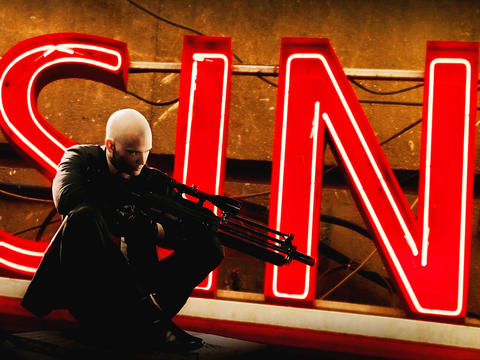Based on the video game franchise of the same title, Hitman exploits every action-flick cliche imaginable and still manages to be dull. It's bang, boom, blah - action movies for bored dummies.
A strangely, at times ridiculously, miscast Timothy Olyphant stars as the titular contract killer, who has been raised by some monastic-looking male order to travel the world in bloody business class, from Africa to Europe to Russia. He's a globetrotting unholy man, a messianic messenger of murder. He's also bald, has a bar code tattooed on the back of his head and is known only as 47. Women leave him cold (if vaguely rattled), which probably comes as a relief to the movie's presumptive adolescent male target audience.
There's a hodgepodge story from the screenwriter Skip Woods, though its details are sufficiently uninteresting to the director, Xavier Gens, to make them uninteresting to anyone watching (or reading about) this mess. In Hitman, Gens, whose feature debut, Frontiere, earned legitimacy by playing at the 2007 Toronto International Film Festival, lavishes his attention on blowing stuff up, including dozens upon dozens of people. Life is always cheap in the exploitation racket, but it's still tiresome watching one after another anonymous extra get a sizable hole blown through his body, to watch movie blood spray like water amid chunks of fake body bits, especially when there's no story to speak of, no decent acting, no wit, no point.

PHOTO: COURTESY OF CMC
Well, there is a point, which is to reel an audience in with an entertaining spectacle of death. In this regard, Gens fails, despite owing a visual and thematic debt to Luc Besson, whose company helped produce this junk. There's loads of noisy violence and gore in Hitman, along with the regulation female nudity (via Olga Kurylenko), but these flashy parts never cohere or gather momentum.
Rather, Olyphant's robotic assassin moves through corridors in effective mimicry of a familiar video game visual strategy, pausing every so often to peer through a gun scope, stare at the pulsing lights on his laptop or brutally dispatch one more generic human obstacle. On occasion, the story shifts to Dougray Scott, whose indifferent turn as an Interpol agent chasing after 47 nicely mirrored my own reaction to the on-screen din.

May 26 to June 1 When the Qing Dynasty first took control over many parts of Taiwan in 1684, it roughly continued the Kingdom of Tungning’s administrative borders (see below), setting up one prefecture and three counties. The actual area of control covered today’s Chiayi, Tainan and Kaohsiung. The administrative center was in Taiwan Prefecture, in today’s Tainan. But as Han settlement expanded and due to rebellions and other international incidents, the administrative units became more complex. By the time Taiwan became a province of the Qing in 1887, there were three prefectures, eleven counties, three subprefectures and one directly-administered prefecture, with

President William Lai (賴清德) yesterday delivered an address marking the first anniversary of his presidency. In the speech, Lai affirmed Taiwan’s global role in technology, trade and security. He announced economic and national security initiatives, and emphasized democratic values and cross-party cooperation. The following is the full text of his speech: Yesterday, outside of Beida Elementary School in New Taipei City’s Sanxia District (三峽), there was a major traffic accident that, sadly, claimed several lives and resulted in multiple injuries. The Executive Yuan immediately formed a task force, and last night I personally visited the victims in hospital. Central government agencies and the

Among Thailand’s Chinese Nationalist Party (KMT) villages, a certain rivalry exists between Arunothai, the largest of these villages, and Mae Salong, which is currently the most prosperous. Historically, the rivalry stems from a split in KMT military factions in the early 1960s, which divided command and opium territories after Chiang Kai-shek (蔣介石) cut off open support in 1961 due to international pressure (see part two, “The KMT opium lords of the Golden Triangle,” on May 20). But today this rivalry manifests as a different kind of split, with Arunothai leading a pro-China faction and Mae Salong staunchly aligned to Taiwan.

As with most of northern Thailand’s Chinese Nationalist Party (KMT) settlements, the village of Arunothai was only given a Thai name once the Thai government began in the 1970s to assert control over the border region and initiate a decades-long process of political integration. The village’s original name, bestowed by its Yunnanese founders when they first settled the valley in the late 1960s, was a Chinese name, Dagudi (大谷地), which literally translates as “a place for threshing rice.” At that time, these village founders did not know how permanent their settlement would be. Most of Arunothai’s first generation were soldiers